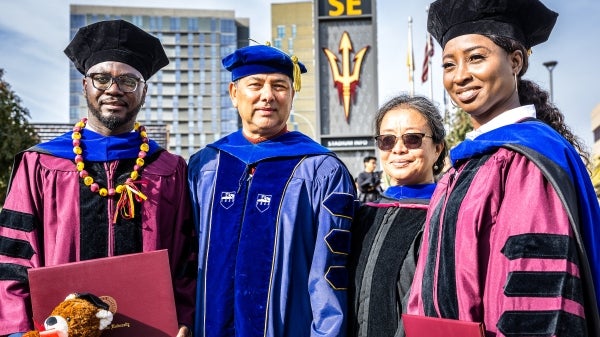Accreditation helps build exacting standards, public trust in law enforcement agencies, ASU professor says

iStock photo by Carmen Whitehead
Accreditation is a tool police agencies can use to help assure the public that sworn personnel adhere to high professional standards, says an Arizona State University professor who recently completed nine years as a commissioner of the leading national law enforcement accrediting organization.
Yet, only about 6% of the approximately 18,000 U.S. state and local law enforcement agencies are accredited, said Joseph Schafer, who teaches in ASU’s School of Criminology and Criminal Justice in the Watts College of Public Service and Community Solutions.
Schafer served as a Commission on Accreditation for Law Enforcement Agencies commissioner from 2016 to 2024. He said accredited agencies employ about 30% of the nation’s sworn officers and therefore tend to be larger outfits.
CALEA is the major law enforcement accreditation entity in the United States. Schafer is only the fifth person in CALEA’s history to hold the 21-member commission’s single seat reserved for an academic.
“There’s nothing mandating that law enforcement agencies be accredited. It’s largely a voluntary process,” said Schafer, who noted that some states have their own accrediting platforms.
Accreditation is not designed to weed out bad agencies, but to encourage good ones to be better, he said.
Most agencies that start the process will complete it — usually in two to three years — as it is an achievement their leaders see as valuable, he said.
“But they do have to put in the hard work.”
The commission will do what it can to help an agency be successful, he said, providing training, technical aid and mentoring resources.
In addition, accreditation underscores that safeguards must exist in line with legal and ethical standards within the profession, Schafer said.
CALEA doesn’t tell agencies how to go about what they do, he said, but rather encourages them to examine what they do, reach their own conclusions, then follow through on them.
“CALEA doesn’t say what your use-of-force policy is, or responding-to-complaints policy is, but that you have to operate within certain dimensions,” he said. “The hallmark in professional policing in the modern era is to be mindful of how the public is to be treated, even people who are doing horrific things. All still have rights.”
He said the situation is similar to when colleges and universities are accredited. An evaluating entity doesn’t tell an institution of higher learning how to teach English composition, for example.
“But if that’s in your curriculum, you must define outcomes and see if those outcomes are being reached,” Schafer said.
Read on to learn more about Schafer’s experience in accreditation.
Note: Answers may have been edited for length or clarity.
Question: What exactly is accreditation for a law enforcement agency?
Answer: Accreditation is a process by which agencies show they have the policies and operational practices that align their organization with the profession’s highest standards. To be accredited by CALEA, law enforcement agencies must show they have comprehensive policies in place, adopted practices that support transparent and accountable operations, and create safeguards to continually ensure they are servicing their community with professionalism and integrity. Those safeguards serve to alert agency leaders if lapses occur so they can be addressed appropriately.
Q: As you point out, law enforcement agencies don’t have to seek accreditation; it isn’t legally required. Why would one want to be accredited?
A: Agencies pursue accreditation to show they have met the highest standards of the profession. This does not mean the agency and its employees will be free of concerns, errors or other issues. However, those should be reduced through accreditation, and the community should feel confident that when a problem arises, an accredited agency has processes in place to address that matter with integrity, transparency and accountability.
Q: Every law enforcement agency is different, of course. But what kinds of criteria must one meet to receive accreditation?
A: Agencies must show they have clear policies guiding employees as they make the most consequential decisions made by police personnel, such as using force, engaging in vehicle pursuits and policing in ways that look to reduce disparate outcomes. Agencies must show they have clear processes in place to receive and investigate allegations of employee or organizational misconduct or errors, and the outcome of those efforts needs to be made transparent to the public.
They must engage in a range of periodic internal analyses (often annually) to examine aspects of agency and officer performance to decide if there are needed changes in training, supervision, equipment, oversight or policy. They also must show they have internal processes that provide clear rights to employees. In this latter way, CALEA is not only about looking to preserve public trust and confidence in the police; it is also looking to ensure police personnel have proper and known rights within the workplace.
Q: Tell us about what motivates agencies to be evaluated for accreditation.
A: Agencies that engage with the CALEA process are truly looking to improve their practices and the services they provide to their community.
Being accredited does not guarantee an agency will be free of events or decisions that concern the community. However, it reduces those situations and ensures the community can express concerns. CALEA agencies are committed to professionalism, continuous improvement and serving their community in ways that enhance safety, trust and justice.
More Local, national and global affairs

ASU helps University of Guyana faculty earn doctoral degrees in expedited program
Shenella Benjamin and Norwell Hinds joined hundreds of other Sun Devils in receiving PhDs from Arizona State University this week, but their journeys were unique.Benjamin and Hinds, both of whom are…

School of Public Affairs surveys thousands of Arizona lawyers, other legal professionals for state bar
When the State Bar of Arizona decided to learn what its members thought about disciplinary procedures, it needed someone to poll its nearly 25,000 lawyers and other legal professionals.The bar…

Arizona’s newest 'college town' says farewell to Mayor John Giles
A few short decades ago Mesa, Arizona, was considered just another quiet little suburb in the Phoenix metro area. Today, the city has surpassed Miami, St. Louis and Atlanta in population size and…
